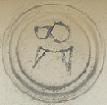One more book down for Philosophy, and I have one more review.
I love Thomas Aquinas. I admire his philosophy. I love the clear, rational, and above all precise way in which he lays out his arguments. I especially like the way he adapts Aristotelian thought for the Christian world. This little treatise, On Being and Essence, is about the metaphysical make up of all things. The short form of the argument is this:
In a simple substance (i.e. God) being = essence. The simple substance is not limited in any way.
In a separate substance (i.e. angels, the human soul) , simple substance = being + essence, where essence is equal to form alone. That is, while separate substances are limited from above because they depend on God for their existence, they are not limited from below because they have no physical matter.
In a composite substance (i.e. everything else), composite substance = being + essence, where essence = form + matter. In a human being, being comes ultimately from God (and in the more immediate sense, from one's parents), form is rational animal and matter is the body. In a table, being comes ultimately from God (and more immediately from the carpenter who assembled it), form is thing with a flat surface for putting things on and the matter is the wood, glue, nails, and etc that make up the particular table.
Thomas is more nuanced then that, and takes the time to address questions tangential to that argument, but that is the main point of the treatise.
That said, I would like to say one thing:
ANY BOOK, NO MATTER HOW SHORT, THAT CONSISTENTLY HAS MORE FOOTNOTES AND EDITOR'S COMMENTS PER PAGE THAN ACTUAL BODY TEXT IS NOT ONE THAT I WANT TO RE-READ.
Rating: 8 out of 10,
For the reason in the caps above, and because it is very difficult for the student to recapitulate. One must be able to quote his arguments all most verbatim, because if one uses the wrong words or clips the wrong corner one descends very quickly away from Orthodoxy and into heresies that were thought wiped out in the 6th century.
-Yami, who has been having to much fun with caps lock lately
Subscribe to:
Post Comments (Atom)

1 comment:
That was fabulous. I havn't reviewed my Aquinas in years but I will dig it out now. Thank you.
Post a Comment